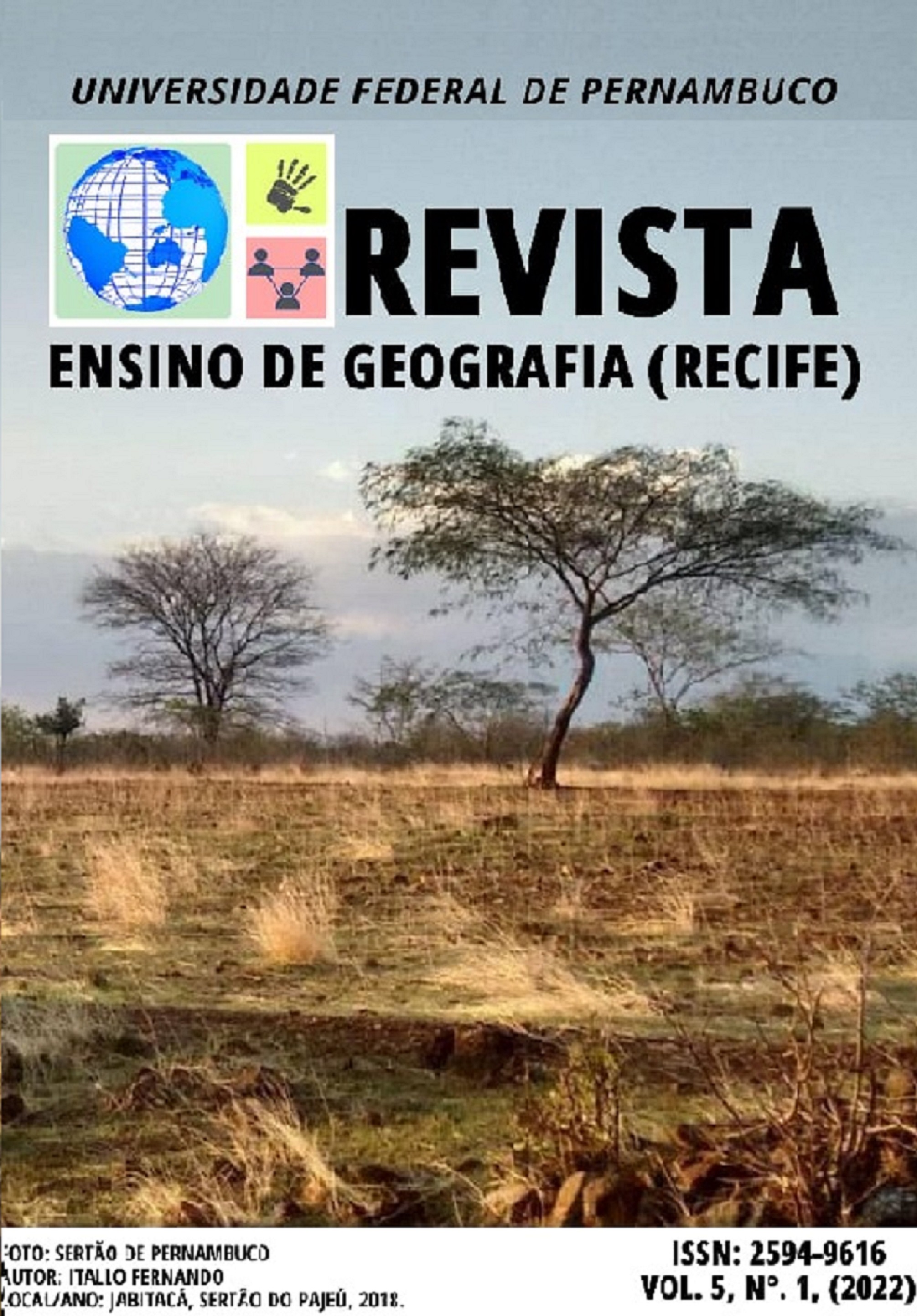Geographical education and citizen training: the international education project “we propose” in basic education in the municipality of Marabá –Pará
DOI:
https://doi.org/10.51359/2594-9616.2022.251232Keywords:
Ensino de Geografia, Formação Cidadã, Projeto Nós Propomos.Abstract
Geography and geographic education are of paramount importance for society, especially when it is present from the school environment to understand the arrangements in the geographic space.The objective of this work is to develop citizenship through the teaching of Geography, with the experience of the “We Propomos” project in basic education in the municipality of Marabá-PA.The methodologies used were based on bibliographical research on topics related to teaching Geography and the city and citizenship in basic education. In the empirical research, for the execution of the “We Propose” project at the Deuzuita Melo de Albuquerque Municipal Elementary School, some steps were carried out, such as: 1) use of qualitative and quantitative questionnaires in order to know the profile of the students, place of residence and conceptions about the concept of citizenship; 2) analysis of the film “The Boy who Discovered the Wind” and subsequent debate about it, relating it to the main idea of the project; step 3) planning and carrying out the field research, the students identified the location of urban problems through satellite images, tracing a possible route; step 4) and finally the exhibition of the project at the VI knowledge fair, held at the respective educational institution.The results were that teaching, research and extension projects, such as “We Propose” dialogue with theory and practice for the understanding and experience of a more pleasurable teaching that at the same time develops citizenship and the right to “live” the city and not only survive it, whether in social, environmental, cultural or political aspects.
References
BRASIL. Lei de Diretrizes e Bases da Educação Nacional, LDB. 9394/1996.
CALLAI, Helena Copetti. Temas e conteúdos no ensino de Geografia. In: Rabelo, Kamila Santos de Paula, Bueno, Míriam Aparecida (Orgs). Currículo, políticas públicas e ensino de Geografia. Goiânia: Ed. da PUC Goiás, p. 213-230, 2015.
CAVALCANTI, Lana de Souza. A geografia escolar e a cidade: ensaios sobre o ensino de geografia para a vida urbana cotidiana. 8. ed. Campinas, SP: Papirus, 2008.
CAVALCANTI, Lana de Souza. Pensar pela Geografia: ensino e relevância social/Lana de Souza. – Goiânia: C&A Alfa Comunicação, 2019. 232p.
CAVALCANTI, Lana de Souza. Geografia, escola e construção de conhecimentos. Papirus Editora, 2013.
CHIAPETTI, Rita Jaqueline Nogueira; DE FREITAS, Glauber Magalhães. Os filmes como instrumento didático-pedagógico para o ensino de geografia. Geografia Ensino & Pesquisa, v. 23, p. 43, 2019.
CLAUDINO, Sergio. Construir uma escola cidadã por meio do Projeto Nós Propomos!: um desafio no espaço Iberoamericano. Sobre Tudo, v. 10, n. 2, p. 35, 2019.
CLAUDINO, Sérgio. PROJETO NÓS PROPOMOS !: A AFIRMAÇÃO DE UMA ALTERNATIVA NA EDUCAÇÃO GEOGRÁFICA ?. In: XVI Colóquio Ibérico Geografia / XVI Coloquio Iberico Geografia . 2018.
COELHO, J. A. P. M.; SOUZA, Gustavo HS; ALBUQUERQUE, Josmário. Desenvolvimento de questionários e aplicação na pesquisa em Informática na Educação. Metodologia de Pesquisa Científica em Informática na Educação: Abordagem Quantitativa, p. 01-27, 2020.
FARIAS, Paulo Sérgio Cunha. A GEOGRAFIA ESCOLAR CRÍTICA E A FORMAÇÃO PARA A CIDADANIA. Revista GeoSertões, v. 5, n. 10, p. 12-39, 2021. Disponível em: < https://cfp.revistas.ufcg.edu.br/cfp/index.php/geosertoes/article/view/1649>. Acesso em 27 de jun. 2021.
LEITE, Cristina Maria Costa. Ensinar e aprender Geografia por meio do Projeto Nós Propomos: a experiência do Distrito Federal. COMISSÃO CIENTÍFICA DO LIVRO, p. 11 -26. 2018.
LIBÂNEO, José Carlos. Sistema de ensino, escola, sala de aula: onde se produz a qualidade das aprendizagens. Políticas de currículo em múltiplos contextos. São Paulo: Cortez, v. 7, 2006.
LODI, Lucia Helena; ARAÚJO, Ulisses F. Ética, Cidadania e Educação: Escola, democracia e cidadania. Secretaria de Educação Básica. Ética e Cidadania: Construindo valores na Escola e na Sociedade. Brasília: MEC, p. 69-76, 2007.
PORTELA. Mugiany Oliveira Brito. Propostas para o ensino de cidade: problematizar, sistematizar, sintetizar e significar. In: Karla Annyelly Teixeira de Oliveira e Lucineide Mendes Pires. Ensinar sobre a Cidade. Goiânia: Editora Espaço Acadêmico, 2017. p. 13-29.
SANTOS, Milton. O espaço do cidadão / Milton Santos. – 7. ed., 2. reimpr. – São Paulo: Editora da Universidade de São Paulo, 2014. 176 p.
VALLERIUS, D.M. A identidade profissional cidadã e o estágio supervisionado de professores de Geografia. 2017. 204 f. Tese (Doutorado em Geografia) – Universidade Federal de Goiás, 2017.
VESENTINI, Jose William. Para uma Geografia crítica na escola. VESENTINI, J.W, 1992.
VYGOTSKY, L.S. A formação social da mente: o desenvolvimento dos processos psicológico superiores. 6. ed. São Paulo: Martins Fontes, 1984.
Downloads
Published
How to Cite
Issue
Section
License
Copyright (c) 2022 Dionel Barbosa Ferreira Júnior, Evandro Frois de Souza, Robson Alves dos Santos, Marcus Vinicius Mariano de Souza

This work is licensed under a Creative Commons Attribution 4.0 International License.
Authors who publish with this journal agree to the following terms:- Authors retain copyright and grant the REVISTA ENSINO DE GEOGRAFIA (RECIFE) right of first publication with the work simultaneously licensed under a Creative Commons Attribution NonCommercial International 4.0 (CC BY-NC) that allows others to share the work with an acknowledgement of the work's authorship and initial publication in this journal.
- Authors are able to enter into separate, additional contractual arrangements for the non-exclusive distribution of the journal's published version of the work (e.g., post it to an institutional repository or publish it in a book), with an acknowledgement of its initial publication in this journal.
- Authors are permitted and encouraged to post their work online (e.g., in institutional repositories or on their website) prior to and during the submission process, as it can lead to productive exchanges, as well as earlier and greater citation of published work.



